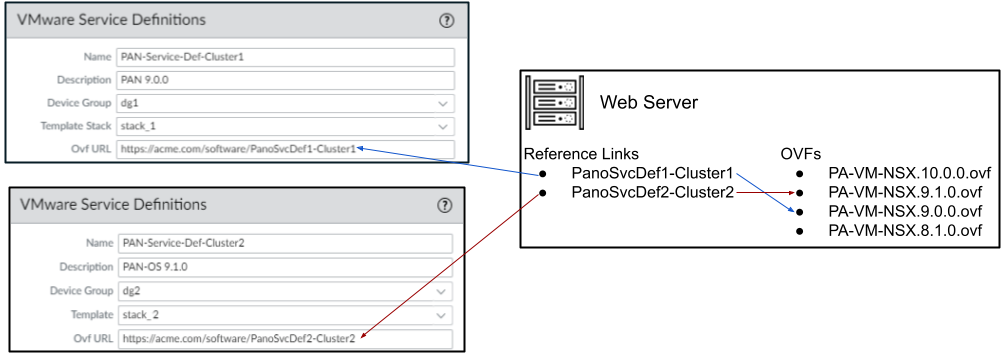NSX-V OVF URL Best Practice
Table of Contents
Expand all | Collapse all
-
-
-
-
- Features Introduced in Zero Touch Provisioning 2.0
- Known Issues in the Zero Touch Provisioning 2.0.4 Release
- Known Issues in the Zero Touch Provisioning 2.0.3 Release
- Known Issues in the Zero Touch Provisioning 2.0.2 Release
- Known Issues in the Zero Touch Provisioning 2.0.1 Release
- Known Issues in the Zero Touch Provisioning 2.0.0 Release
- Limitations
-
-
NSX-V OVF URL Best Practice
It is recommended that you use an OVF path name that
scales and allows you to change the base image without impacting
your deployed firewalls. Instead of a path such as https://acme.com/software/PA-VM-NSX.9.1.0.ovf,
use something such as https://acme.com/software/PanoSvcDef1-Cluster1.ovf.
Using a static path reference will eliminate any future need to
change the OVF path. It is recommended to create a path for each
Panorama service definition (vSphere cluster) in your deployment
and change the PAN-OS base images references on the web server as
needed.
To use a different OVF for an existing Service Definition, change
the reference link on the web server to point to another OVF. Changing
the web server OVF reference links will not impact existing NSX-V
Service Deployments. The new OVF path will take affect on new service
deployments or any hosts introduced into the vSphere Cluster.

Do not change the Panorama service definition
OVF path after a successful NSX Service Deployment of VM-Series
firewalls. Changing the OVF path, after a successful VM-Series firewall
deployment, can result in a NSX Service Deployment failed state.
With VMware guidance, you may resolve this failure in NSX-V Manager,
however this may cause all VM-Series firewalls to redeploy.
